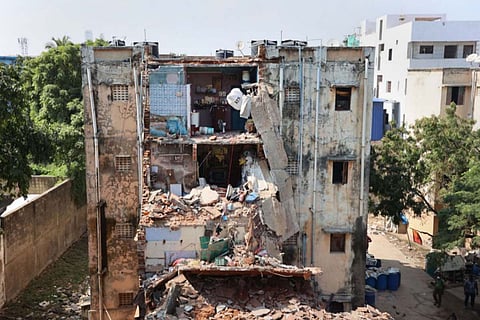

For residents of the Tamil Nadu Urban Habitat Development Board (TNUHDB, formerly TNSCB) in the Arivakulam area of Chennai’s Tiruvottiyur, the widely reported collapse of Block D has worsened their already fragile living conditions. On the morning of December 27, one wing of the building completely fell down. Though there were no casualties or injuries as the wing was evacuated with barely any time to spare, the nightmare was far from over for the residents. That same night, TNM received calls that the adjacent Block E had also begun to sink into the ground. Already flustered from the day’s events, they said they were quick to clear the building. As of Monday night, according to residents, rescue personnel were engaged in moving out possessions.
TNM spoke to a number of residents, all of whom were firm on their demand that they be given temporary housing until the current structure — which is over 30 years old — can be razed and rebuilt. Some, like Nisha who lives in Block E, are unwilling to permanently move elsewhere. Arivakulam is close to the sea, which is a source of income. “I work in a seafood export factory. Like me, most people here are daily wage earners. I clean prawns and squid for which I earn 200 to 500 rupees a day. Today’s wages are lost because I came running from work as soon as my husband called to tell me what happened.” Nisha pointed to the cracks developing in her block, on the building’s exterior and inside her home.
Cracks in the basement and inside Block E
Superficial repairs already deteriorating
Another wing of the same E block, which seems to have felt the aftershock of the Block D’s collapse, also appears to be collapsing, residents say. “I saw our fridge slide a few feet and go back when that block fell,” Nisha’s young daughter claims.
With the safety of each of the blocks compromised, many residents are unsure what they’re going to do next. A major concern is that they’re not the official residents in these tenements. At least half of them, residents claim, are renting their homes from the people to whom the flats were allotted by the TNUHDB. “Outside, the deposit alone will be 30,000 rupees. Who here has that much on hand? Here they pay about Rs 2000 in rent,” says a friend of the residents. Now several of them have been asked by the house owners to leave. “We will not even get any of the compensation the state has announced,” says Nisha, “It will go to the owners.”
Several other residents spoke of a pressing issue exacerbating their crisis: no proof of residence. The owners allegedly do not allow their renters to have any documentary evidence in their name. From gas bills to voter IDs to Aadhaar cards, all documents bear the addresses of previous residences, they say. “If there is proof, any compensation or benefits from the government will have to be shared with us,” Babu, a resident, says. “People who have come to live here, could not afford housing outside. So, they adjust. Now some house owners are asking us to leave. We have been living like refugees in our own country.”
Unable to spend the night in any of the structurally compromised blocks, many slept outside in the surrounding open spaces. Even as evening set in, when many reporters, officials and rescue personnel were on site, mosquitoes and flies swarmed these same areas. At night, this could have only been worse. In a video, sent by a resident around 11 pm, some are seen cooking where they will be spending the night. Others are attempting to sleep.
Thiruvottriyur tenement collapse: Many residents of the surviving blocks spent last night camped outside with nowhere else to shelter with their belongings.
— Bharathy Singaravel|பாரதி| بارتي (@KuthaliPu) December 28, 2021
Video from a resident. pic.twitter.com/g8B5KpfZWS
From what we can gather, the residents of the collapsed building — about 24 families — alone have been shifted to a nearby hall. It is unclear if food or bedding was provided to the others forced to camp outside. “I’ve brought my gas cylinder and stove outside. The fridge is still there. It wasn’t easy buying that fridge, but what to do?” asks a resident tiredly over the phone.
“We’ve been complaining about the cracks and the state of the building for years,” says one resident whose home was in the wing of block D that collapsed. “I’ve lived here for 18 years. About seven years ago, all these blocks had developed cracks. We’d complain at the collectorate or to any politician who visits. At the most some plaster work or other inadequate repairs like replacing the sunshades gets done. If the place floods from the rains, we’ll get some food for a few days. Nobody really listens,” she says.
Even at the time this disaster occurred, similar repair work was ongoing for one of the blocks. But for Arivakulam’s residents, temporary measures are not enough.